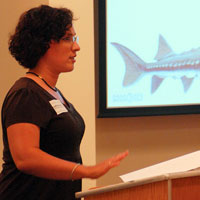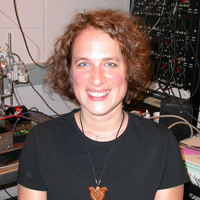|
Meet Our Graduate Students
 Michaela Meyer Michaela Meyer
Member of Dr. Arthur N. Popper's Laboratory of Aquatic Bioacoustics
PhD candidate, Department of Biology
From: born and raised in Bonn, Germany
Education:
- Certified biological technical research assistant, Rheinische Akademie e.V. Cologne (Major: Biochemistry),1992
- Fellowship at University of Sa.o Carlos in Sa.o Paulo (1997), Brazil to investigate the adaptive mechanisms of air breathing fishes to extreme environmental conditions
- German diploma in biology, (equivalent of American master’s degree), Rheinische Friedrich-Wilhelms-Universität Bonn, Germany, (Biological sciences/Neurophysiology), 1999
Languages spoken: German, English, Portuguese, French
Michaela Meyer learned to appreciate the diversity of organisms and their ability to adapt to changes in the environment as a young child. Her father was a biologist and her family’s vacations were like field trips where he would show everyone birds and plants. Her first trip to the United States was a family camping trip to the Everglades National Park, not Disney World, as some might expect.
During her studies in Germany and her fellowship in Brazil, Michaela developed an interest in the sensory systems and evolutionary adaptations of fish. Her diploma thesis explored the lateral line of fish, an organ used to sense local water flow. Sensory hair cells grouped into receptors (called “neuromasts”) along the fish’s lateral line convert the motion of water into signals that the nervous system can interpret. These sensory hair cells are very similar to the cells found in the human ear, and understanding how they function in fishes will contribute to our understanding of how hearing in humans (and other animals) works.
Investigating the Auditory Systems of Fish
She pursued her PhD at the University of Maryland to join the team working with Dr. Arthur Popper, whose laboratory is focused on the study of hearing by aquatic organisms. She is co-mentored by Dr. Popper and by Dr. Richard Fay of the Loyola University of Chicago.
Her research focuses on how fish convert an auditory stimulus into a neural signal. This neural signal is called a neural code. There are certain neural coding strategies used by animals to determine the location of a sound (called sound source location) and to perform frequency analysis.
Understanding the Evolution of "Auditory Scene Analysis"
Sound provides animals (including humans) with important information about their environment creating an acoustic view. To create this acoustic view (or scene) of the environment, an animal needs to be able to detect, localize, and identify sound sources (to perform auditory scene analysis). Thus, sound source location and frequency analysis are important tasks of the auditory system.
Michaela wants to better understand the evolution of this scene analysis ability in vertebrates. To address this, she is investigating hearing in the sturgeon, a group of bony fish that originated more than 200 million years ago, and comparing it to goldfish, a more recent bony fish using electrophysiological techniques (single cell recordings). Studies in modern bony fish have shown that their auditory system is capable of complex signal analysis comparable in many ways to those performed by mammals. Her major findings demonstrate that similar basic neural codes for sound direction and frequency exist in the periphery of sturgeon and goldfish. This finding supports the idea that basic hearing mechanisms used for scene analysis have remained relatively unchanged since the earliest vertebrates that evolved an auditory system.
Supporting Conservation, Expanding Knowledge of Sensory Biology
Her dissertation project contributes both to the understanding of the sensory biology of sturgeon and the evolution of hearing. Moreover, since sturgeon are generally considered endangered (with some of the 26 species being among the most endangered in the world), this research also provides important data that can potentially support the conservation of this economically important and environmentally threatened group of fish.
After completing her PhD, Michaela will join the laboratory of Dr. Ruth Anne Eatock in the Department of Otolaryngology, Harvard University as a postdoctoral fellow expanding her knowledge on how hair cells in vertebrates are converting a sound stimulus into a neurophysiological response – focusing at the ion channels in the utricular epithelium of vertebrates.
Learn more about the work in Dr. Popper’s Lab by visiting www.life.umd.edu/biology/popperlab
|

![]()

 Sound provides animals (including humans) with important information about their environment, creating an acoustic 'view'. Michaela seeks to better understand the evolution of the ability to perform "auditory scene analysis."
Sound provides animals (including humans) with important information about their environment, creating an acoustic 'view'. Michaela seeks to better understand the evolution of the ability to perform "auditory scene analysis."